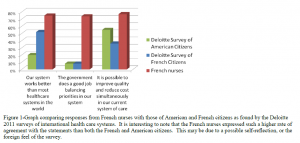Cami Schiel and Dr. Leslie Miles, College of Nursing
The purpose of this project was to examine how foreign nurses (specifically French nurses) perceived their healthcare system, and those in other countries. This ultimately led to additional insight into where they get their perceptions, positive and negative aspects of different types of healthcare systems, and some differences between the French and American systems. It was fascinating.
The French healthcare system is a public system, meaning that taxes cover most of the healthcare costs. Their social security is set up to pay for about 70% of the official rate of the cost of care for most cares1. The rest must be paid for by the patient or by their voluntary insurance package. There are a few instances where social security reimburses close to 100% of the costs, such as a long term or major illness (i.e.: cancer) or pregnancies. While the public hospitals charge the official rate, private clinics and hospitals are free to choose their rates, often charging much more.
I got in contact with the Director of Care at a French hospital and she gave me permission to come and survey willing nurses. I traveled to Avignon, France and gave paper surveys to the nurses and nurses’ assistants on several of the floors at the public hospital, the Centre Hospitalier d’Avignon. The survey was around 20 questions long and covered demographic information as well as opinions regarding healthcare systems around the world. The nurses responded to questions about their opinions about the French healthcare system, ranked eight countries’ healthcare systems from around the world, and ranked different sources of information according to how much these influenced their opinions. I asked them questions about their work environment and the potential of the French healthcare system for balance and success. I had about 60 nurses and nurses’ assistants participate in the study.
Their comments and responses provided insight into the French system. I had the impression that they responded in a similar manner that nurses in the United States might respond—and in many cases they admitted they didn’t know that much about international healthcare systems. However their general opinion of their own system was high—much higher than Americans’ opinions of the U.S. system, as found by the Deloitte 2011 survey2. And the main reason they gave for their high opinion was the general access to care. They also noted that their main sources for their opinions were coworkers and the workplace.
The French nurses agreed with the World Health Organization’s (WHO) 2000 Survey of Healthcare Systems to rank France as #1 out of the given countries3. However, they ranked Japan lower on the list and the U.S. higher on the list than did the WHO. This may suggest a lack of knowledge about trends of the different Asian countries in regards to healthcare. While the French nurses generally approved of the accessibility of their system, they noticed that some negative aspects of their system included abuse and lack of control, a budget deficit, and lack of personnel.
With the current heath care reform in the United States leaning towards a more public system, these insights are important to take into consideration during the planning and implementation of the Affordable Healthcare Act. In addition, these findings indicate that nurses are in a position to influence others’ opinions—their colleagues, their patients, and the public at large. Nurses are generally thought of as trusted sources of information, a theme also indicated in this study. This infers that nurses have the responsibility to be educated about various issues and be articulate as they express opinions.
While I had anticipated giving online surveys to the French nurses, they preferred paper ones. I had to print off the survey and then go back and enter the data in the computer manually. Next time I would survey more French nurses in both public and private hospitals. I would also survey nurses in other countries—the U.S., and other European countries.
I presented my findings in one of the breakout sessions at the Nursing Research Conference held at UVU in October.4
References
- Brunner, S. (2004, June 27). The French Healthcare System. Medical News Today. Retrieved from http://www.medicalnewstoday.com/articles/9994.php
- Deloitte. (2011b). 2011 Survey of Health Care Consumers in the United States, Key Findings, Specific Implications. Retrieved from http://www.deloitte.com/assets/Dcom-UnitedStates/Local%20
Assets/Documents/US_CHS_2011ConsumerSurveyinUS_062111.pdf - World Health Organization, (WHO). (2000). Health Systems: Improving Performance. The World Health Report 2000 [Annex Table 10]. Retrieved from http://www.who.int/whr/2000/en/whr00_en.pdf
- Sponsorship by BYU Office of Research and Creative Activities (ORCA) and the BYU College of Nursing

